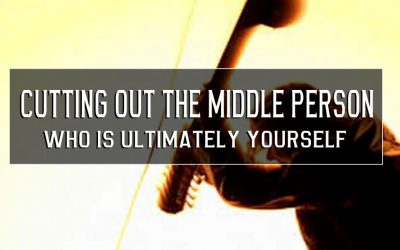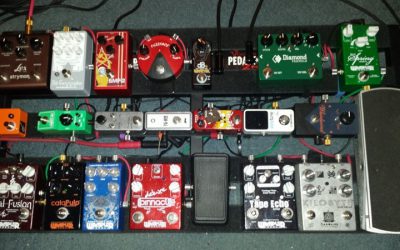Despite the obvious nature of a tip like “you have to take care of your muscles” when playing a musical instrument like the guitar, I’ve recently been forced to really examine what my playing time to care time ratio has been like, and make some necessary changes.
Lately, and not for the first time, I’ve been dealing with a flare up of carpal tunnel syndrome, a situation where either genetic or environmental factors cause the median nerve in the wrist to get compressed, which causes numbness, pain, and is generally a gigantic pain in the butt to a working guitar player! Now, genetics we can’t do much about at home, but environmental factors we guitar players can certainly look at to prevent or deal with injuries, and so I write this with the aim of telling you how I’ve been managing my own muscle care in the hope that you’ll come up with a daily preventative action plan for your own guitar-playing muscles.
1. Fore-arm oil massages
It was only when going to a remedial massage therapist recently that I realised how much tension I carry in my forearms every day of the week. Now, I’ve been playing guitar a long time and if anyone has learned to refine and relax their muscles when playing, it’s me. But even still, the therapist took to my arms like a couple of thick steaks that needed some serious tenderising. She told me that usually the only people with forearms worked this hard are people in her own industry.
Using a little oil (cooking oil, massage oil, anything to lube up the hands and fore arm), you can tenderise the meat in your own arms by using your thumbs to really stretch out those outer and inner muscles of your forearm, honing in on any particular pressure points. Alternate between hands so that you don’t do further damage as massaging can be quite tiring. Work the wrists, the fingers of both hands, and spend at least 10 minutes in total. You don’t need to be a specialist to look after your own body, but if in doubt, see a massage therapist and take note of the areas they work on.
2. Shoulder, tricep, neck and back care
Stretching all of these areas before a practice session is essential. If you don’t know what to do to prepare these parts of your body, consult a professional, or even look up some stretching routines on YouTube. The problem is, we usually don’t make positive change until something goes wrong, or the time we spend stretching a little is disproportionate to the time spent playing.
Put together a little routine for yourself, and if your practice is going to be happening for extended periods of time, make sure you stand up and repeat some stretches or shake off any tension whenever you feel the need.
3. Maintain good posture
Years ago I learned this one the hard way by practising obsessively until I was so tired and hunched over the guitar that the neglect of my neck and back caused a painful tendonitis around my picking arm tricep.
4. Drink water in your practice sessions
It can be easy to get carried away and let the hours fly. Make sure you stay hydrated, eat properly and keep a snack nearby to keep you fuelled!
5. Use sports braces when injury strikes
Immobilising my wrists at night with some properly splinted braces has been a God-send for my carpal tunnel syndrome, so if you do need to take some time out for injury, heal those muscles properly with complete rest.
6. See a professional about injuries promptly
Chances are the odd thing will come up and it will pass with time and the right advice, but it’s best not to push things and assume that everything will go away.
Go to a doctor, not a guitar forum. I can’t count the number of times I’ve seen guitar players asking a forum what’s wrong with their hands. A doctor doesn’t come and teach my students, so why would I treat their patients? 😉
If you’re a working guitar player, your arms are your income, and if you’re a hobbyist, your arms are your passion. Make sure the amount of care you give them is proportionate to the enjoyment they bring playing the guitar!
Chris Brooks
Chris Brooks is a Wampler Artist, working guitar player, educator and recording artist from Sydney Australia.


0 Comments